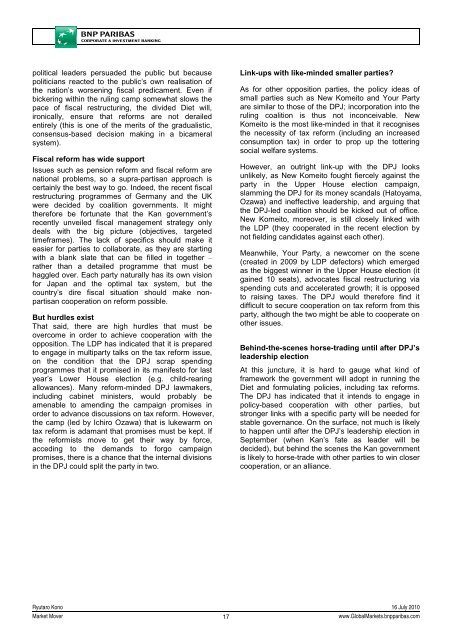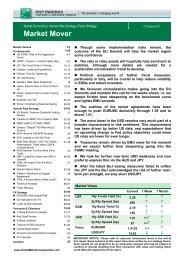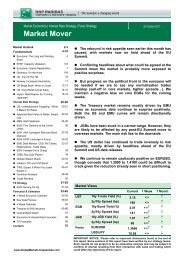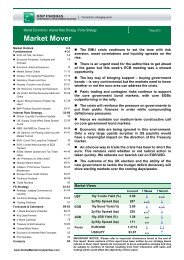Market Economics | Interest Rate Strategy - BNP PARIBAS ...
Market Economics | Interest Rate Strategy - BNP PARIBAS ...
Market Economics | Interest Rate Strategy - BNP PARIBAS ...
You also want an ePaper? Increase the reach of your titles
YUMPU automatically turns print PDFs into web optimized ePapers that Google loves.
political leaders persuaded the public but because<br />
politicians reacted to the public’s own realisation of<br />
the nation’s worsening fiscal predicament. Even if<br />
bickering within the ruling camp somewhat slows the<br />
pace of fiscal restructuring, the divided Diet will,<br />
ironically, ensure that reforms are not derailed<br />
entirely (this is one of the merits of the gradualistic,<br />
consensus-based decision making in a bicameral<br />
system).<br />
Fiscal reform has wide support<br />
Issues such as pension reform and fiscal reform are<br />
national problems, so a supra-partisan approach is<br />
certainly the best way to go. Indeed, the recent fiscal<br />
restructuring programmes of Germany and the UK<br />
were decided by coalition governments. It might<br />
therefore be fortunate that the Kan government’s<br />
recently unveiled fiscal management strategy only<br />
deals with the big picture (objectives, targeted<br />
timeframes). The lack of specifics should make it<br />
easier for parties to collaborate, as they are starting<br />
with a blank slate that can be filled in together –<br />
rather than a detailed programme that must be<br />
haggled over. Each party naturally has its own vision<br />
for Japan and the optimal tax system, but the<br />
country’s dire fiscal situation should make nonpartisan<br />
cooperation on reform possible.<br />
But hurdles exist<br />
That said, there are high hurdles that must be<br />
overcome in order to achieve cooperation with the<br />
opposition. The LDP has indicated that it is prepared<br />
to engage in multiparty talks on the tax reform issue,<br />
on the condition that the DPJ scrap spending<br />
programmes that it promised in its manifesto for last<br />
year’s Lower House election (e.g. child-rearing<br />
allowances). Many reform-minded DPJ lawmakers,<br />
including cabinet ministers, would probably be<br />
amenable to amending the campaign promises in<br />
order to advance discussions on tax reform. However,<br />
the camp (led by Ichiro Ozawa) that is lukewarm on<br />
tax reform is adamant that promises must be kept. If<br />
the reformists move to get their way by force,<br />
acceding to the demands to forgo campaign<br />
promises, there is a chance that the internal divisions<br />
in the DPJ could split the party in two.<br />
Link-ups with like-minded smaller parties?<br />
As for other opposition parties, the policy ideas of<br />
small parties such as New Komeito and Your Party<br />
are similar to those of the DPJ; incorporation into the<br />
ruling coalition is thus not inconceivable. New<br />
Komeito is the most like-minded in that it recognises<br />
the necessity of tax reform (including an increased<br />
consumption tax) in order to prop up the tottering<br />
social welfare systems.<br />
However, an outright link-up with the DPJ looks<br />
unlikely, as New Komeito fought fiercely against the<br />
party in the Upper House election campaign,<br />
slamming the DPJ for its money scandals (Hatoyama,<br />
Ozawa) and ineffective leadership, and arguing that<br />
the DPJ-led coalition should be kicked out of office.<br />
New Komeito, moreover, is still closely linked with<br />
the LDP (they cooperated in the recent election by<br />
not fielding candidates against each other).<br />
Meanwhile, Your Party, a newcomer on the scene<br />
(created in 2009 by LDP defectors) which emerged<br />
as the biggest winner in the Upper House election (it<br />
gained 10 seats), advocates fiscal restructuring via<br />
spending cuts and accelerated growth; it is opposed<br />
to raising taxes. The DPJ would therefore find it<br />
difficult to secure cooperation on tax reform from this<br />
party, although the two might be able to cooperate on<br />
other issues.<br />
Behind-the-scenes horse-trading until after DPJ’s<br />
leadership election<br />
At this juncture, it is hard to gauge what kind of<br />
framework the government will adopt in running the<br />
Diet and formulating policies, including tax reforms.<br />
The DPJ has indicated that it intends to engage in<br />
policy-based cooperation with other parties, but<br />
stronger links with a specific party will be needed for<br />
stable governance. On the surface, not much is likely<br />
to happen until after the DPJ’s leadership election in<br />
September (when Kan’s fate as leader will be<br />
decided), but behind the scenes the Kan government<br />
is likely to horse-trade with other parties to win closer<br />
cooperation, or an alliance.<br />
Ryutaro Kono 16 July 2010<br />
<strong>Market</strong> Mover<br />
17<br />
www.Global<strong>Market</strong>s.bnpparibas.com
















